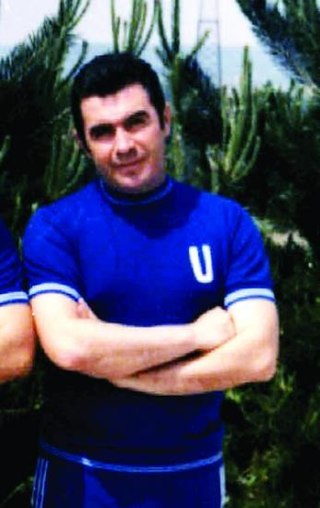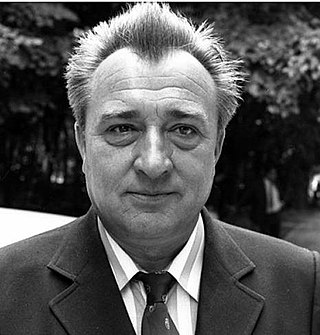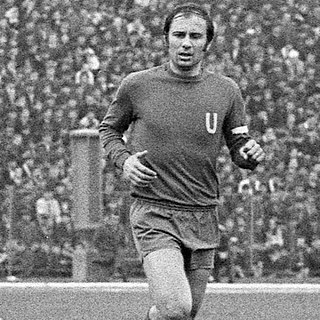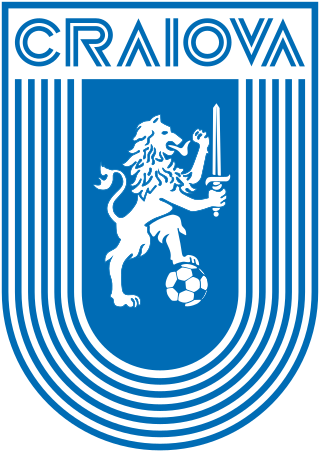Related Research Articles

FCU 1948 Craiova Fotbal Club, commonly known as FC U Craiova 1948 or simply FC U Craiova, is a Romanian professional football club based in Craiova, Dolj County, that competes in the Liga II, the second tier of the Romanian league system.

Silviu Lung is a retired Romanian football goalkeeper and current manager.

Eugen Trică is a Romanian football manager and former footballer who played as a midfielder.

Constantin Cernăianu was a Romanian football player and coach.

Valentin Stănescu was a Romanian football goalkeeper and manager.

Clubul Sportiv Municipal Unirea Alba Iulia, commonly known as Unirea Alba Iulia, is a Romanian professional football club based in Alba Iulia, Alba County, founded in 1924 and currently playing in the Liga III.

Costică Ștefănescu was a Romanian football player and coach who last managed Qatari side Al Shamal. He spent the majority of his career at FC Universitatea Craiova, where he made a club-record 378 appearances. He is also the second all-time appearance leader in Liga I, having played in 490 matches. In 1983, Ștefănescu was nominated for the Ballon d'Or. He played for the Romania national team from 1977 to 1985, and was capped 66 times. In August 2013, after suffering from cancer for a long time, he committed suicide by jumping from the fifth floor of the military hospital in Bucharest.

Constantin Teașcă also known as Titi Teașcă was a Romanian football player and manager.

Daniel Ovidiu Tudor is a Romanian football coach and a former goalkeeper, currently goalkeeping coach at Liga I club Universitatea Craiova.

Fotbal Club Caracal was a Romanian professional football club from Caracal, Olt County. The club's best period was in the early 90s when Electroputere Craiova, as it was called then, played four consecutive seasons in the Romanian first league. The best ranking was obtained in the 1991–92 season when finished 3rd and qualified to UEFA Cup.
Ionel Tersinio Gane is a Romanian football coach and former player who is an assistant coach for the Romania national team.

Ion Oblemenco was a Romanian football striker who spent the majority of his career playing for Universitatea Craiova. He is known for being four times the top-goalscorer of the Romanian top-division, Divizia A, having a total of 170 goals scored in his 272 appearances in the competition, however these performances were not enough to earn him a cap for the national team.
Ion V. "Jackie" Ionescu was a Romanian football player and coach.
Ilie Oană was a football player and manager.

U Craiova 1948 Club Sportiv, commonly known as Universitatea Craiova, CS U Craiova, or simply U Craiova, is a Romanian professional football team based in Craiova, Dolj County. It competes in the Liga I, the top tier of the Romanian league system.

Asociația Fotbal Club Hermannstadt, commonly known as FC Hermannstadt, Hermannstadt, or familiarly as Sibiu, is a Romanian professional football club based in the city of Sibiu, Sibiu County, that competes in the Liga I.

Remus Vlad is a Romanian former professional footballer and manager. Vlad played as a defender.
Adrian Pigulea is a retired Romanian football striker.
Viorel Firu Smarandache was a Romanian footballer who played as a defender.
Universitatea Craiova was a Romanian professional football club based in Craiova, Dolj County. Between 1948 and 1991, Universitatea won four national titles and five national cups. In addition to its domestic success, its reputation as a major club in the country was established by being the first Romanian team to reach the semi-finals of a UEFA tournament, and remains the only one to have knocked out at least one club from each of five strongest countries in European football—England, France, Germany, Italy and Spain.
References
- ↑ "Marian Bondrea". worldfootball.net. Retrieved 16 February 2021.
- ↑ "Fotbal Liga1, Cupa Romaniei".
- ↑ "Fotbal Liga1, Cupa Romaniei".
- ↑ "Romanian_Cup_1992_1993 - statistics".
- ↑ "Romanian_Cup_1993_1994 - statistics".
- ↑ "MARİAN BONOREA". TFF . Retrieved 12 February 2010.